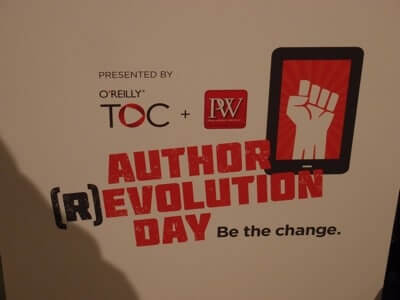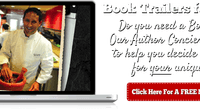
Tools of Change started today. In addition to some technical workshops, something new is happening. This is “Author [R]evolution Day.” It’s an all-day series of talks for authors about what’s going on with the publishing revolution. Tools of Change is mainly for the publishing professional and the type of content and the cost of attendance are not aimed at average authors. Having received some criticism for this, today is the first attempt by O’Reilly to cater to authors and provide them a forum that is affordable. Most every seat was sold out. I noticed that the majority of people were taking notes. The presentation was designed to have no bias about self-publishing vs regular publishing and the goal was to give all authors some aid and guidance. Here are some of the highlights of the presentations that have the widest interest for our readers.
First up was the famous author Cory Doctorow. His basic point was a good one, that DRM puts the provider of the book, such as Amazon, in the driver’s seat and takes power away from the author. Once DRM has been applied to a book, it is illegal for anyone other than the one who introduced it to remove it. For authors, this means that once someone, like Amazon, puts DRM on your book, then you are stuck with it because you can’t remove it from your own book even if you find it is hurting sales. It puts the seller of the book in charge and removes all the control from the author. He also made a typical Doctorow aphorism: “Converting fame into money is hard alchemy. Most people who try it fail. Fame won’t make you rich, but you won’t get rich without fame.”
Following this, Eve Bridburg and Porter Anderson discussed what an author needs to do to succeed. Typically, the guidance for authors is to create an author platform for social media and then hope that this creates a marketplace. But the problem for authors is that there are almost too many tools and and authors are running around trying to do everything with every tool. This creates fear and dread in authors, and so they are running around trying to pick out their best tactics, but there is little help for them in developing an overall strategy. Takeaways: find a community of some sort to help you; be purposeful and don’t let the tactics lead. It is important to develop an overall strategy about what you want and then let the tactics take over: whatever you do, it is important that you do things that you enjoy, because if you don’t enjoy it the work won’t get done and you will be miserable.
Then there was an interesting presentation on the use of free content by Rob Eagar, President of Wildfire Marketing. He said that Bowker reports that 582,000 new titles were published in a 12 month period, so getting noticed is hard. The important thing is that readers don’t need as much reason to buy a book as people think. Many people will buy a book without ever looking at the content, so you need to create reasons for them to do so. One of the best ways to do this is to give away content. If a campaign is designed properly, it will not cannabilize sales, but instead multiply them. The free content must answer the purchaser’s question “what’s in it for me” and this works for fiction as well as non-fiction. For novelists, free short stories and novella are effective, as they easily attract fiction fans. This worked well for Stephanie Meyer. Use your expertise to bring people to your fiction books (for example, an author of a series of Amish stories set up a website about Amish history and culture). The site contained links to her books, but mostly it is strictly factual. Thus, people interested in facts about the Amish were also introduced to her books.
Community driven publishing was discussed by Jacob Lewis (Figment.com), Amanda Barbara (Pubslush), Scott James (Red Hat Project), Mark Jeffrey (glossi.com), and Allen Lau (Wattpad). Scott James made the point that Kickstarter is a good way to promote a book and is an excellent way to build a “street” team as funders have a stake in the process, will promote the book, and this has paid back exponentially in the Kickstarter book he created. People want to be part of the discovery process and crowd funding is a great way to get them involved. Alan Lau had some interesting figures on Wattpad. They have 14 million monthly visitors spending 3 billion minutes of reading time per month. There are 10 million stories on the site and there is and 1 upload every 2 seconds.
Choosing a production and distribution service was the subject of a panel discussion with Peter Armstrong, LeanPub; Sabrina McCarthy, Argo Navis; Libby Johnson McKee, Amazon CreateSpace; and Tim Sanders, Netminds. In the very beginning, an author needs to set their goals and this will set their distribution strategy,but you have to understand your own personality and assets. If you are not a self-starter, then self-publishing is not for you. You also need to understand what is the best use of the time. There are a lot of publishing platforms that will let you do everything, which takes a lot of time, or should you let other people do some stuff so that you can use your strengths in other ways. In terms of choosing a distribution platform, first figure out who your customer is and then that should drive the type of distribution you need. In general, it is best to be in as many places as possible. The number one mistake that authors make is that they overestimate their editing skills and so editorial services are very important. Design services are important because you need to have an outside designer figure out what the public needs to see.
In addition to the above there were sessions on metadata (by Linda Dawson and very well done!), the place of the agent and strategies for marketing and discovery. The session participants were well chosen and articulate and I found the session to be definitely worth my time. I think most authors would find the entrance fee well worth it.
